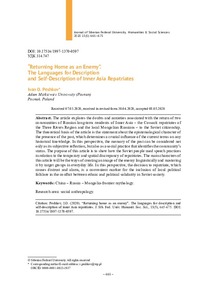“Returning Home as an Enemy”. The Languages for Description and Self-Description of Inner Asia Repatriates
Скачать файл:
URI (для ссылок/цитирований):
https://elib.sfu-kras.ru/handle/2311/135296Автор:
Peshkov, Ivan O.
Пешков, И.О.
Дата:
2020-05Журнал:
Журнал Сибирского федерального университета. Гуманитарные науки. Journal of Siberian Federal University. Humanities & Social Sciences;2020 13 (5)Аннотация:
The article explores the doubts and anxieties associated with the return of two communities of Russian long-term residents of Inner Asia – the Cossack repatriates of the Three Rivers Region and the local Mongolian Russians – to the Soviet citizenship. The theoretical basis of the article is the statement about the epistemological character of the presence of the past, which determines a crucial influence of the current terms on any historical knowledge. In this perspective, the memory of the past can be considered not only as its subjective reflection, but also as a social practice that identifies the community’s status. The purpose of this article is to show how the Soviet people used speech practices in relation to the temporary and spatial discrepancy of repatriates. The main characters of this article will be the ways of creating an image of the enemy linguistically and mastering it by target groups in everyday life. In this perspective, the decision to repatriate, which causes distrust and alarm, is a convenient marker for the inclusion of local political folklore in the conflict between ethnic and political solidarity in Soviet society Статья исследует сомнения и тревоги, связанные с возвращением в
поле советского гражданства двух сообществ русских старожилов Внутренней Азии:
казаков-репатриантов из Трехречья и местнорусских из Монголии. Теоретической
основой статьи является положение о эпистемологическом характере присутствия
прошлого, что обозначает определяющее влияние современных условий на
историческое познание в его любых формах. В этой перспективе память о прошлом
может рассматриваться не только как его субъективное отражение, но и как
социальная практика, определяющая статус сообщества. Задача данной статьи –
показать, как советский человек использовал речевые практики по отношению
к временному и пространственному несоответствию репатриантов. Способы
лингвистического создания образа врага и его освоение целевыми группами в
обычной жизни будут главными вопросами этой статьи. Вызывающее недоверие
и тревогу решение о репатриации в этой перспективе является удобным маркером
включения локального политического фольклора в конфликт между этнической и
политической солидарностями в советском обществе

